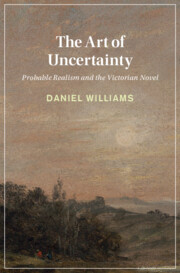Book contents
- The Art of Uncertainty
- Cambridge Studies in Nineteenth-Century Literature and Culture
- The Art of Uncertainty
- Copyright page
- Epigraph
- Contents
- Illustrations
- Acknowledgments
- Introduction
- Part I Provisional Judgments
- Chapter 1 Indecision Theory
- Chapter 2 Unproven Verdicts
- Part II Probable Realisms
- Coda
- Notes
- Bibliography
- Index
- Cambridge Studies In Nineteenth-Century Literature And Culture
Chapter 1 - Indecision Theory
Hesitation and Comparison in Eliot
from Part I - Provisional Judgments
Published online by Cambridge University Press: 29 February 2024
- The Art of Uncertainty
- Cambridge Studies in Nineteenth-Century Literature and Culture
- The Art of Uncertainty
- Copyright page
- Epigraph
- Contents
- Illustrations
- Acknowledgments
- Introduction
- Part I Provisional Judgments
- Chapter 1 Indecision Theory
- Chapter 2 Unproven Verdicts
- Part II Probable Realisms
- Coda
- Notes
- Bibliography
- Index
- Cambridge Studies In Nineteenth-Century Literature And Culture
Summary
Abundant moments of indecision and delay shape George Eliot’s last novel Daniel Deronda (1876), which treats uncertainty as a recursive movement between interior and exterior, potentiality and activity. This chapter shows how Eliot explores action’s convoluted antecedents, drawing on intellectual trends in mid-century comparative method and physiological psychology, especially the latter’s portrait of embodied willing and pathologies of volition. These contexts frame a reading of the novel’s twin stances of practical experience and intellectual reflection: hesitation, the bewildering experience of having a “will which is and yet is not yet,” and its rational cousin, comparison, “our precious guide.” Formal fluctuations and portrayals of mental caprice would seem at cross-purposes with Eliot’s narrative control and moral coherence. Yet in discovering a “kinship” between certainty and doubt, she reinvigorates her novelistic ethics and recasts sympathy as guaranteed by “closer comparison between the knowledge which we call rational & the experience which we call emotional.” Her characters set store by irresolute stances of hesitation and comparison, and predictive affects like trust and hope.
Keywords
- Type
- Chapter
- Information
- The Art of UncertaintyProbable Realism and the Victorian Novel, pp. 39 - 77Publisher: Cambridge University PressPrint publication year: 2024



